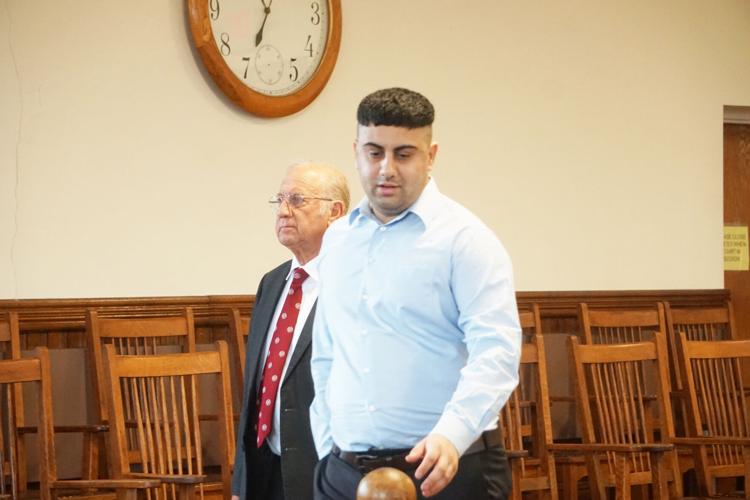LACONIA — In the final day of witness testimony in the second trial of Hassan Sapry, jurors learned that while two psychological experts agree on a lot, they disagree on insanity.
“In my opinion, [Sapry’s actions] were not” a product of mental illness, Dr. Albert Drukteinis, forensic psychiatrist, said Friday morning in Belknap County Superior Court.
Sapry, 27, is on trial for the April 2019 murder of Wilfred Guzman Sr., then 58, in his Blueberry Lane apartment. State prosecutors Jeffery Strelzin and Alexander Kellmermann spent a week providing evidence and testimony to jurors to support nine charges against Sapry, including first- and second-degree murder.
Superior Court Judge Elizabeth Leonard on Tuesday dismissed one of those charges, a count of falsifying physical evidence, related to Sapry’s apparent throwing of a cellphone owned by Guzman Sr. into Lake Winnisquam following Guzman Sr.'s killing.
Sapry has raised the not guilty by reason of insanity defense, an affirmative one which he must prove to the jury by the lesser burden of “by clear and convincing evidence.” Prosecutors must prove Sapry committed the crimes of which he’s accused, beyond a reasonable doubt.
Attorneys Mark Sisti and Amy Ashoworth of Sisti Law Offices are retained by Sapry for his defense.
On Thursday, forensic psychologist Dr. Eric Drogin, a defense witness, told jurors it is his opinion Sapry’s actions in killing Guzman Sr. were the product of mental illness.
Both psychological experts agreed Sapry did and does indeed suffer from post-traumatic stress disorder, obsessive-compulsive disorder and depression.
Friday morning, Drukteinis told jurors he’s evaluated between 125 and 150 defendants, looking at things like criminal responsibility, insanity, competency to stand trial and general “dangerousness.” In 25%-30% of cases, a not guilty by reason of insanity defense may apply, he said.
And he doesn’t think Sapry’s case is one of them.
Drukteinis was called as a rebuttal witness by state prosecutors.
Drukteinis said he performed a psychological evaluation on Sapry to assess his mental state, and reviewed 3,000 pages of discovery records. The state Attorney General’s Office contacted him quickly following the discovery of the crime and Sapry’s subsequent arrest on April 26, 2019, a week after investigators came upon the chaotic scene of a brutal killing.
In New Hampshire, the question of criminal insanity is adjudicated by the jury, and the standard is two-fold: at the time of the crime, did the defendant suffer from a mental disorder or defect? And, if so, were those actions a result of the same? It’s called the Durham test, and it’s unique to New Hampshire.
“There’s a big difference between mental disease or mental defect and mental disorder,” Drukteinis said, noting insanity is, in essence, a legal question. “We’re talking about insanity, which is totally a jury issue, not a psychiatric issue.”
Drukteinis said psychiatrists typically view such questions through a specific lens: did an individual suffer a serious mental condition that substantially impacts mental processes or behavioral controls? Usually such a situation is limited to psychosis, he said, which is when an individual is “out of contact with reality.”
“He certainly had mental disorders, but I did not determine that he was psychotic,” Drukteinis said, noting there’s insufficient evidence to suggest Sapry could not control his actions, but rather that he did not control his actions.
“He knew who Mr. Guzman was, he knew who he was, and he knew what he had done,” Drukteinis said.
Sapry did have homicidal ideation and fantasies of violence since he was around 13 years old, according to both doctors. Drogin on Thursday, for example, testified Sapry frequently viewed what prosecutors described as “murder porn,” videos depicting the untimely death of an individual.
Sapry may have also harbored resentments, Drukteinis said. He told police he’d had arguments with Guzman Sr., and comments made by Guzman Sr. regarding race and religion in the past made him — in his own words — “super angry.” He also said he believes Sapry hoped to one day marry Guzman Sr.’s daughter Natashia, and Guzman Sr. may have discouraged him from doing so “at the very least.”
“The incident was very violent and angry,” Drukteinis said. “[Sapry] even described it as a rage.”
The combined disappointment of a lack of approval regarding a marriage proposal by Guzman Sr., plus anger Sapry held onto after perceived or actual slights, explain his actions better than wanton and random violence, Drukteinis said.
“He suffered from a mental disorder, but not a mental illness,” implying substantial impairment, Drukteinis said Friday.
But Sisti disagreed with Drukteinis, forcefully, about his interpretation.
Psychosis is not required in New Hampshire to determine insanity, Drukteinis agreed under cross-examination by Sisti, and Sapry did harbor intrusive, homicidal ideation. He suffered mental disorders in the timeframe of the killing, and Sisti said Sapry loved Guzman Sr., and hoped visiting him would remind Sapry he didn’t want to hurt him.
Sisti also told Drukteinis that, according to information obtained from a relative of Natashia who was familiar with the contents of a conversation between Sapry and Guzman Sr. pertaining to a potential marriage proposal, Guzman Sr. cautioned Sapry against it due to “trust issues” on Natashia’s part.
“Actually, Mr. Guzman is looking out for Hassan” in that conversation, Sisti said Friday afternoon.
“It’s only a lynchpin because it stands in contrast to an unexplainable act,” Drukteinis said.
Each side will submit their closing arguments Tuesday, Sept. 2, after which time the jury is scheduled to begin their deliberations.



















(0) comments
Welcome to the discussion.
Log In
Keep it Clean. Please avoid obscene, vulgar, lewd, racist or sexually-oriented language.
PLEASE TURN OFF YOUR CAPS LOCK.
Don't Threaten. Threats of harming another person will not be tolerated.
Be Truthful. Don't knowingly lie about anyone or anything.
Be Nice. No racism, sexism or any sort of -ism that is degrading to another person.
Be Proactive. Use the 'Report' link on each comment to let us know of abusive posts.
Share with Us. We'd love to hear eyewitness accounts, the history behind an article.